Support group offers solace, guidance to Alzheimer’s caregivers
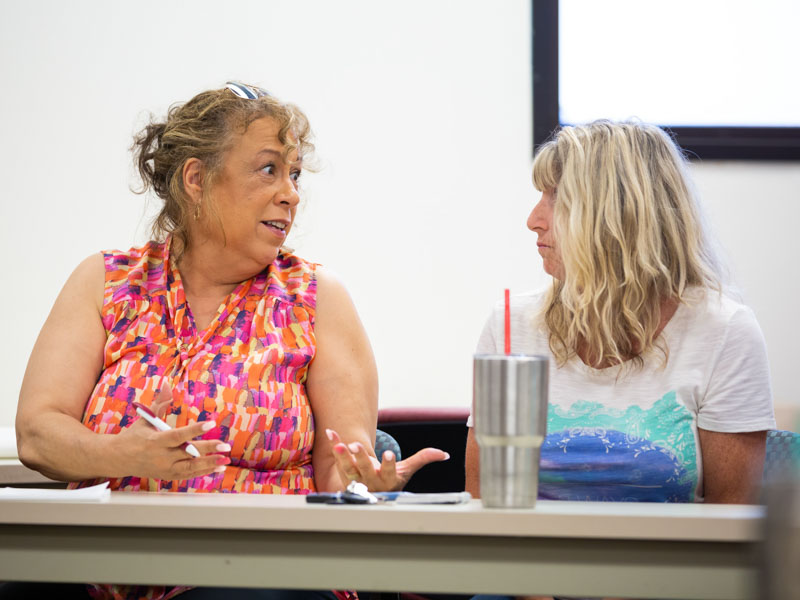
Medicaid and Medicare. Skilled nursing versus memory care versus assisted living. Diagnoses. Long-term care insurance. Home health versus sitters. Sundowning. Hospice. End-stage.
The list of issues that caregivers of family members with Alzheimer’s and dementia must contend with is long, complex and often overwhelming. The emotional toll of seeing a loved one slip away is heavy, and the unpredictability of the disease is anxiety-provoking.
That’s why the Memory Impairment and Neurodegenerative Dementia (MIND) Center and the Division of Geriatrics at the University of Mississippi Medical Center offers a support group for caregivers of people with dementia each month in Jackson and Flowood.
The Jackson group is the second oldest in the state and the oldest in the metro area, said Sue Ann Meng, a social worker in the MIND Center with 42 years of experience in geriatric social work who leads the group. Meng has been at UMMC since 2002 and with the MIND Center Clinic since its beginnings in 2013. The Flowood group was started in 2018 and is led by Jennifer Knight, an RN care coordinator with the MIND Center since 2015.
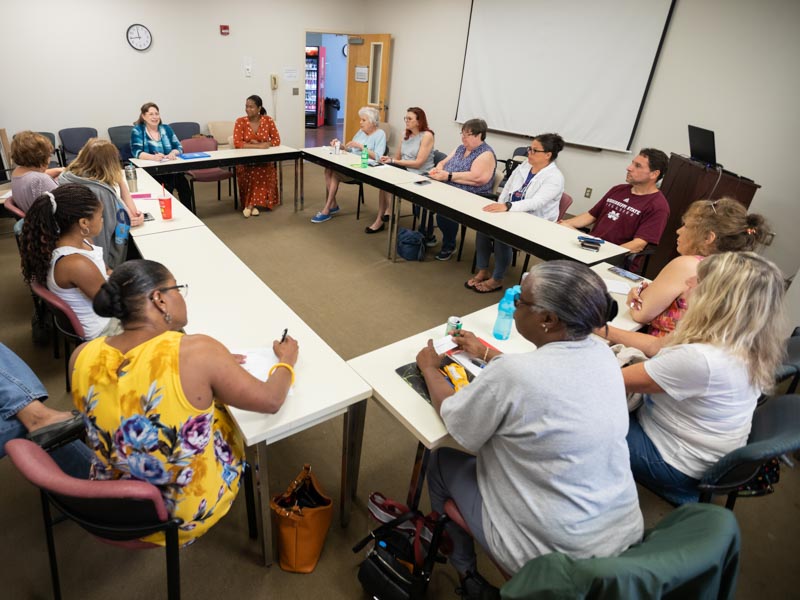
At each support group meeting, a physician who specializes in geriatric care is there to answer any medical questions those in the support group might have.
“We are unique in that there is a geriatrician or a fellow at every meeting,” Meng explained.
The perspective comes in handy.
At the May meeting in Jackson, one caregiver asked an important question: “Everyone keeps talking about end-stage dementia. How do you know when it’s end-stage?”
That night Dr. Lyssa Weatherly, assistant professor of geriatrics, was in attendance.
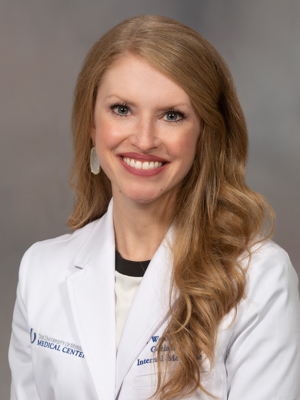
“End stage has many symptoms, some of which include weight loss; little to no intake; bed sores; non-verbal; immobile; hospitalization twice a year; and certain combinations of those,” Weatherly answered.
But often the early stages of dementia are just as tough for caregivers as the end stages. The primary caregiver is in a unique, and sometimes lonely, situation.
“There’s usually one family member who really sees the symptoms (of a loved one’s dementia) and who wants to move forward, but other siblings will say, ‘I just talked to Daddy on the phone and he’s fine,’” Meng described. “The kids or family members who are not absolutely involved on a daily basis don’t get the same information that primary caregivers get. As a result, they have to fight with their own siblings (or family). That’s a battle that’s really tough.”
Weatherly echoes that sentiment.
“Being the caregiver and loved one of a demented patient is such a heavy load to bear. But no one quite understands what the weight of that feels like more so than someone who carries a similar load,” she said.
Enter the support group – a group of people who truly understand what each other is going through.
Mandy Strong-White is the youngest of seven siblings and has done her fair share of caretaking. While in college, her father had heart problems and passed away. Her mother, a severe diabetic, lived with her for nine years after that. Her husband did dialysis in their home and later passed away of kidney failure. She also helped care for a brother who succumbed to bone cancer.
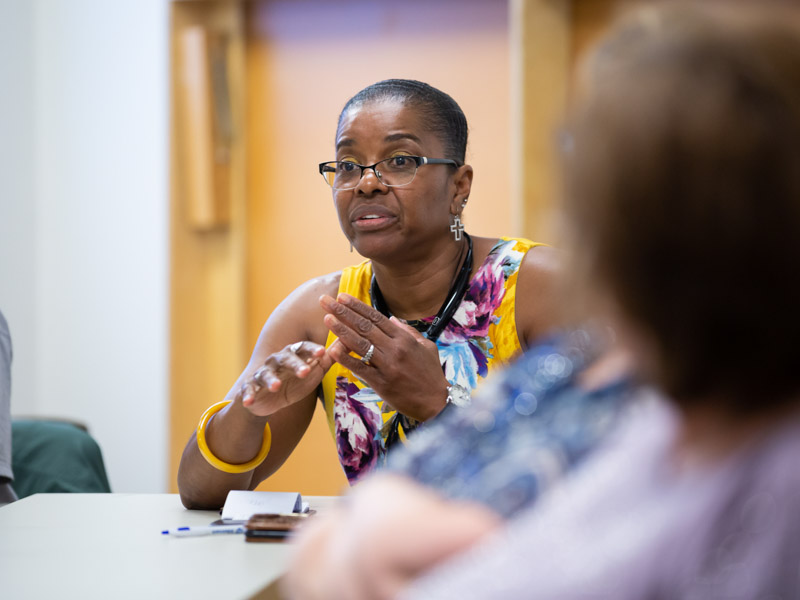
But when her sister began exhibiting signs of dementia in 2014, she was overwhelmed.
“I’ve dealt with a lot of other things, but I knew this was something different,” she said. “In all those other caregiving issues, those loved ones had all been at a point they could articulate their needs … They were able to differentiate fact from fiction. And with the dementia, you just kind of have to guess what’s needed and what’s not because so often they’ll look at you, and for instance, may tell you their stomach’s hurting when it’s actually their head hurting.”
After her sister lived with her for 10 months, Strong-White began coming to the support group and soon was looking forward to the meeting every month.
“Coming here gave me the reassurance that I can survive this caregiving thing. I come and learn from others and the strategies they use,” she said. “I learn through every story.”
Alice Skelton also attends the support group, usually with her 85-year-old mother Elsie Skelton in tow. She is a full-time caregiver for her.
Alice first knew something was off in 2010 when her mom went for what should’ve been a 15-minute drive from her Jackson home and wound up 75 miles away in Tchula. Thankfully, while Alice was on the phone with her mother, a police officer pulled Elsie over and helped her get back to Highway 49. Alice and her sister met their mom in Yazoo City, and Alice got in the car and drove her home.
“We drove for probably 15 to 20 minutes and I said ‘why didn’t you turn around, Mom?’ and she said, ‘Well, I knew what was behind me, and I didn’t want to go back there so I kept going straight,’” Alice remembered.
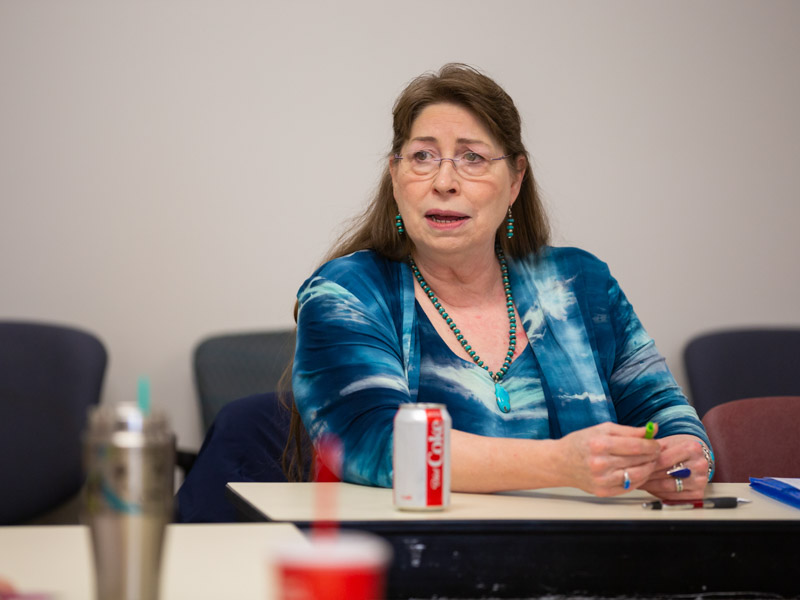
A week later Alice took her mom to Dr. Kathy Gregg, associate professor of geriatrics, which began a years-long relationship.
Alice’s mother has continued to decline, and she calls the support group “my sanity.”
“This is normally the place where I can somewhat vent,” she said, explaining that other family members don’t understand the toll being a full-time caregiver takes on her.
She said it also takes away some of the fear associated with such an unpredictable disease.
“You don’t know how it’s really going to play out and what the end is going to look like. I’m still scared, but not nearly to the level I was,” she said.
In addition to the availability of a medical professional and the insight from other caregivers, Meng herself is a treasure trove of information with more than 42 years of experience in geriatric social work. She is encouraged to take phone calls and emails from support group members looking for guidance during her work day.
“The true gem of the support group is really Sue Ann Meng. She is a resource like none other; she is a wealth of knowledge with a heart of pure gold and a spirit of true service,” Weatherly said.
For more information about the support group, click here.


